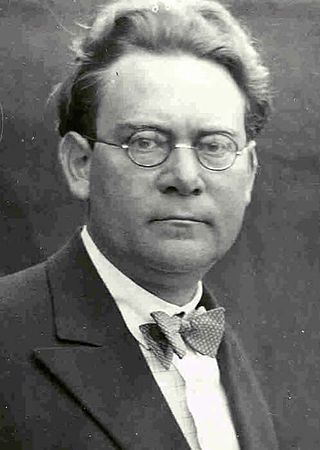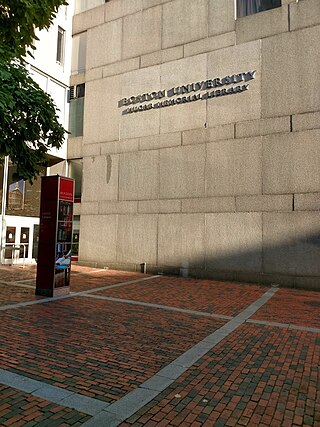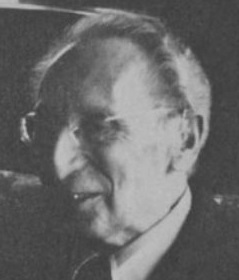
Boston University Center for Philosophy and History of Science is an interdepartmental, interuniversity forum on the nature of science, and each year organizes the Boston Colloquium for Philosophy of Science.

Boston University Center for Philosophy and History of Science is an interdepartmental, interuniversity forum on the nature of science, and each year organizes the Boston Colloquium for Philosophy of Science.
The Center for Philosophy and History of Science was founded in 1960 as an interdisciplinary, interuniversity collaboration, based at Boston University, with a small seed grant from the National Science Foundation. The Center was an offshoot of the Institute for the Unity of Science, [1] which was itself the American transplant of the Vienna Circle. The Institute's central figure, Philipp Frank, had been one of the Vienna Circle's member and founder, and took part in the development of the Center's Colloquium series. [2] [3] The Center was founded by Robert S. Cohen, who was a professor of philosophy and physics at BU, and Marx W. Wartofsky, a professor of philosophy at BU. In 1993, Alfred I. Tauber, the Zoltan Kohn Professor of Medicine and Professor of Philosophy at Boston University, was appointed director, succeeding Professor Cohen. [4] In 2010, Alisa Bokulich [5] was appointed director. [6]
There is only one older such center in North America, and that is the University of Minnesota’s Center for Philosophy of Science, which was founded in 1953 around Herbert Feigl. Both Herbert Feigl and Philipp Frank fled Europe for the U.S. when the Nazi’s came to power. [7] [8]
Beginning in 1963, the proceedings of many colloquia were published in the series Boston Studies in the Philosophy of Science (first by the D. Reidel Publishing Company, then by Kluwer Academic Publishers, Dordrecht, and now by Springer). [2] Under the editorship of Robert Cohen, the "Boston Studies in the Philosophy of Science" produced more than 200 volumes in the areas of philosophy of the natural and social sciences, logic, mathematics, and the history and social relations of science. [4]
Over the past 50 years, the Colloquium has hosted talks by the most prominent figures in the philosophy of science.[ citation needed ]

Each year, the Center hosts the Boston Colloquium for Philosophy of Science, an eclectic program of symposia and lectures about all aspects of the philosophy and history of the sciences, mathematics, and logic.
The CPHS is closely linked to the Center for Einstein Studies, also based at Boston University. The Center for Einstein Studies is directed by John Stachel. Boston University's Mugar Memorial Library holds a complete copy of physicist Albert Einstein's papers. Such copies, whose originals are in the Hebrew University of Jerusalem, [9] can only be found at Boston University, Princeton University, and at the California Institute of Technology where the Einstein Papers Project is now located. [10]

Otto Karl Wilhelm Neurath was an Austrian-born philosopher of science, sociologist, and political economist. He was also the inventor of the ISOTYPE method of pictorial statistics and an innovator in museum practice. Before he fled his native country in 1934, Neurath was one of the leading figures of the Vienna Circle.

Friedrich Albert Moritz Schlick was a German philosopher, physicist, and the founding father of logical positivism and the Vienna Circle.

The Vienna Circle of logical empiricism was a group of elite philosophers and scientists drawn from the natural and social sciences, logic and mathematics who met regularly from 1924 to 1936 at the University of Vienna, chaired by Moritz Schlick. The Vienna Circle had a profound influence on 20th-century philosophy, especially philosophy of science and analytic philosophy.
Philipp Frank was a physicist, mathematician and philosopher of the early-to-mid 20th century. He was a logical positivist, and a member of the Vienna Circle. He was influenced by Mach and was one of the Machists criticised by Lenin in Materialism and Empirio-criticism.
Gerald James Holton is an American physicist, historian of science, and educator, whose professional interests also include philosophy of science and the fostering of careers of young men and women. He is Mallinckrodt Professor of Physics and professor of the history of science, emeritus, at Harvard University. His contributions range from physical science and its history to their professional and public understanding, from studies on gender problems and ethics in science careers to those on the role of immigrants. These have been acknowledged by an unusually wide spectrum of appointments and honors, from physics to initiatives in education and other national, societal issues, to contributions for which he was selected, as the first scientist, to give the tenth annual Jefferson Lecture that the National Endowment for the Humanities describes as, “the highest honor the federal government confers for distinguished achievement in the humanities”.
Raimo Heikki Tuomela ) was a Finnish philosopher.

Carl Gustav "Peter" Hempel was a German writer, philosopher, logician, and epistemologist. He was a major figure in logical empiricism, a 20th-century movement in the philosophy of science. Hempel articulated the deductive-nomological model of scientific explanation, which was considered the "standard model" of scientific explanation during the 1950s and 1960s. He is also known for the raven paradox.

Hans Reichenbach was a leading philosopher of science, educator, and proponent of logical empiricism. He was influential in the areas of science, education, and of logical empiricism. He founded the Gesellschaft für empirische Philosophie in Berlin in 1928, also known as the "Berlin Circle". Carl Gustav Hempel, Richard von Mises, David Hilbert and Kurt Grelling all became members of the Berlin Circle.


Herbert Feigl was an Austrian-American philosopher and an early member of the Vienna Circle. He coined the term "nomological danglers".
Abner Eliezer Shimony was an American physicist and philosopher. He specialized in quantum theory and philosophy of science. As a physicist, he concentrated on the interaction between relativity theory and quantum mechanics. He authored many works and research on complementarity in quantum entanglement as well as multiparticle quantum interferometry, both relating to quantum coherence. He authored research articles and books on the foundations of quantum mechanics. He received the 1996 Lakatos Prize for his work in philosophy of science. Shimony is also the author of Tibaldo and the Hole in the Calendar, a 1998 children's book about the calendar reform that has been translated into many languages.
The International Encyclopedia of Unified Science (IEUS) was a series of publications devoted to unified science. The IEUS was conceived at the Mundaneum Institute in The Hague in the 1930s, and published in the United States beginning in 1938. It was an ambitious project that was never completed.
Jan Hertrich-Woleński is a Polish philosopher specializing in the history of the Lwów–Warsaw school of logic and in analytic philosophy.

Philosophy of Science is dedicated to the furthering of studies and free discussion from diverse standpoints in the philosophy of science. It is a peer-reviewed academic journal.
Rohit Jivanlal Parikh is an Indian-American mathematician, logician, and philosopher who has worked in many areas in traditional logic, including recursion theory and proof theory. He is a Distinguished Professor at Brooklyn College at the City University of New York (CUNY).
An index list of articles about the philosophy of science.

Werner Leinfellner was professor of philosophy at the University of Nebraska–Lincoln and at the Vienna University of Technology. After recovering from life-threatening wounds during World War II, he studied chemistry and physics at the Universities of Vienna and Graz, eventually turning to the study of the philosophy of science, and receiving his Ph.D. in 1959. He moved to the United States in 1967, in part, because of problems faced by empirically oriented philosophers in obtaining academic positions in Austria and Germany. He is notable for his contributions to philosophy of science, as a member of European Academy of Sciences and Arts, for founding the journal Theory and Decision, for co-founding Theory and Decision Library, and for co-founding the Austrian Ludwig Wittgenstein Society and International Wittgenstein Symposium.
Alisa Bokulich is an American philosopher of science and Professor of Philosophy at Boston University. Since 2010 she has been the Director of the Center for Philosophy and History of Science at Boston University, where she organizes the Boston Colloquium for Philosophy of Science, and serves as a Series Editor for Boston Studies in Philosophy and History of Science. She was the first woman ever to be tenured in the Philosophy Department at Boston University and the first woman to become a director of a center for history and philosophy of science in North America.

David Beniaminovich Zilberman was a Russian-American philosopher and sociologist, scholar of Indian philosophy and culture. He was well-versed in the study of languages and knew Russian, Sanskrit, English, Slavic languages, Ancient Greek, French, and German.

Philosophical Problems of Space and Time is a book about the philosophy of space and time by the philosopher Adolf Grünbaum. It is recognized as a major work in the philosophy of the natural sciences.